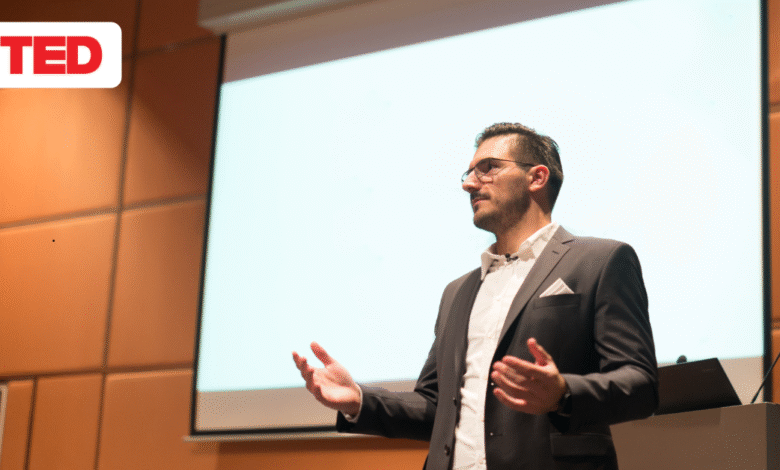14 Best TED Talks About Money You Need To Watch

Ever caught yourself scrolling through videos at 2 AM, looking for that one thing that’ll finally make money make sense? Yeah, me too. And honestly, TED Talks have this weird way of dropping knowledge that stick with you way longer than any boring finance textbook ever could.
Here’s the thing: most of us weren’t taught squat about money growing up. We learned algebra (when was the last time you used that?) but not how to negotiate a salary or why we can’t stop buying stuff we don’t need. Wild, right?
That’s where these talks come in. I’ve spent way too many hours watching money-related TED Talks, and I’m about to save you the trouble of sorting through the mediocre ones. These 14 speakers bring real talk about everything from why you’re underpaid to how your brain sabotages your savings account.
Whether you’re drowning in debt, trying to figure out this whole investing thing, or just want to stop feeling guilty every time you check your bank balance, there’s something here for you. Let’s get into it.
14 Best TED Talks About Money You Need To Watch
Look, I’m not going to promise these talks will make you rich overnight (if anyone promises that, run). But they will change how you think about earning, spending, and building wealth. And sometimes, that mindset shift is worth more than any quick cash hack.
Ready to have your financial worldview rocked? Here are the talks that actually deliver.
1. Know Your Worth, and Then Ask for It by Casey Brown
This talk hits different if you’ve ever accepted less money than you deserved because asking felt awkward. Casey Brown is a pricing consultant, and she gets straight to the point: most people are broke because they’re too scared to ask for what they’re worth.
Brown breaks down why we undervalue ourselves (spoiler: it’s not just imposter syndrome, though that doesn’t help). She explains that knowing your value is step one, but communicating it confidently is where the magic happens. And honestly? This applies whether you’re freelancing, negotiating a raise, or pricing your side hustle.
Here’s what stuck with me:
- You’re probably leaving money on the table right now, just because you haven’t asked
- Confidence isn’t arrogance when you can back it up with results
- The conversation about money gets easier the more you practice it
If you’ve ever said “I’m not good at talking about money,” this talk is your wake-up call. Brown gives you the framework to stop apologizing for your rates and start owning your worth.
For anyone who’s ever felt underpaid (so, like, most of us), this is essential viewing. It’s not just about asking for more. It’s about fundamentally shifting how you see your own value in the marketplace.
Watch it here: Know Your Worth, and Then Ask for It
2. Saving for Tomorrow, Tomorrow by Shlomo Benartzi
Why is saving money so freaking hard? Shlomo Benartzi tackles this question head-on, and his answer is both frustrating and liberating: our brains are basically wired to mess this up.
Benartzi is a behavioral economist (fancy term for someone who studies why we make terrible decisions), and he created something called the “Save More Tomorrow” program. The genius of it? Instead of trying to save money right now (which feels impossible), you commit to saving more in the future when you get a raise.
It sounds almost too simple, but the psychology behind it is solid. We’re way better at making good decisions for Future Us than we are for Right Now Us. Future You can totally handle saving an extra 3% of your paycheck. Present You? Present You wants tacos.
Key takeaways from this talk:
- Your brain prioritizes immediate pleasure over long-term security (thanks, evolution)
- Small, automatic changes work better than dramatic overhauls
- Timing your savings decisions strategically makes them way easier to stick with
This talk is perfect if you’re the person who keeps promising to start saving next month, and then next month never comes. Benartzi gives you a practical system that works with your psychology, not against it.
The “Save More Tomorrow” approach has helped thousands of people build wealth without feeling deprived. And honestly, anything that makes saving feel less painful gets a thumbs up from me.
Watch it here: Saving for Tomorrow, Tomorrow
3. Sell Your Crap. Pay Your Debt. Do What You Love by Adam Baker
Adam Baker’s talk title alone is worth the price of admission (which is free, but you get what I mean). This guy and his family were drowning in debt, surrounded by stuff they didn’t need, living a life that looked good on paper but felt empty.
So they did something radical: they sold almost everything they owned, paid off their debt, and moved to Australia for a year with their baby. Sounds crazy, right? But Baker makes a compelling case that we’re all a little crazy for doing the opposite.
This isn’t just a minimalism talk (though there’s definitely some of that). It’s about questioning the consumer treadmill we’re all on. Do you really need that stuff, or are you just buying it because society says successful people have lots of stuff?
Baker’s main points hit hard:
- Your possessions own you more than you own them
- Debt steals your freedom to make choices you actually want to make
- Experiences create way more happiness than things (science backs this up, FYI)
What I love about this talk is that it’s not preachy. Baker isn’t telling you to live in a van (unless that’s your thing). He’s just asking: what would your life look like if you weren’t spending money on stuff that doesn’t matter?
If you’re feeling trapped by debt or overwhelmed by clutter, this talk might just give you the push you need to make a change. Sometimes the path to financial freedom starts with a really good yard sale.
Watch it here: Sell Your Crap. Pay Your Debt. Do What You Love
4. How to Buy Happiness by Michael Norton
Can money buy happiness? According to Michael Norton, a Harvard Business School professor, the answer is yes. But (and this is a big but), you’re probably spending it wrong.
Norton’s research shows that how you spend matters way more than how much you have. Dropping $500 on a new TV? Meh, you’ll get used to it in a week. Spending $500 on a weekend trip with friends? Those memories stick with you forever.
The most surprising finding? Spending money on other people makes you happier than spending it on yourself. I know, it sounds counterintuitive. But the data is solid, and honestly, it makes sense when you think about it. That warm fuzzy feeling you get from treating a friend to lunch? That’s your brain rewarding you for social connection.
Norton’s research reveals:
- Experiences beat possessions every single time for long-term happiness
- Giving to others creates more joy than treating yourself
- Small, frequent pleasures work better than big, rare splurges
This talk completely changed how I think about spending. Instead of asking “Can I afford this?”, I started asking “Will this actually make me happier in a meaningful way?” That shift alone has saved me thousands on stuff I would’ve bought and forgotten about.
If you’ve ever felt guilty about spending money or wondered why that shopping high fades so quickly, Norton’s talk provides the answers. And better yet, it gives you a roadmap for spending in ways that actually improve your life.
Watch it here: How to Buy Happiness
5. Does Money Make You Mean? by Paul Piff
This talk is uncomfortable in the best way possible. Paul Piff, a social psychologist, conducted experiments that show how wealth changes behavior, and spoiler alert: not always for the better.
One of his most famous studies involved a rigged Monopoly game. When players were randomly assigned to be “rich” (more money, better dice rolls), they started acting more entitled, taking up more space, and showing less empathy toward the “poor” player. And here’s the kicker: they attributed their success to their own skill, not the rigged rules.
Sound familiar? Piff’s research suggests that as people accumulate wealth, they often become less compassionate and more self-focused. But before you start hating on rich people, he also shows that this isn’t inevitable. Cultivating gratitude and generosity can counteract these effects.
The key insights from this talk:
- Wealth can decrease empathy and increase entitlement (but it doesn’t have to)
- How you think about your success matters more than the success itself
- Small acts of generosity can keep you grounded regardless of your income
What makes this talk so valuable is that it’s not just about rich people. It’s about all of us and how we relate to money and status. Even small increases in wealth can shift our behavior if we’re not paying attention.
If you’re curious about the psychology of money and inequality, or if you just want to make sure success doesn’t turn you into a jerk, this talk is essential viewing. Plus, Piff’s delivery is engaging and backed by solid research, which is always a win.
Watch it here: Does Money Make You Mean?
6. My No Spend Year by Michelle McGagh
Michelle McGagh is a personal finance journalist who decided to do something extreme: spend absolutely nothing on non-essentials for an entire year. No restaurants, no new clothes, no coffee shops, no entertainment. Just the basics.
Now, before you think “that sounds miserable,” hear her out. McGagh discovered something surprising: she wasn’t any less happy. In fact, in many ways, she was happier. Without the constant temptation to spend, she had to get creative about fun, which led to deeper friendships and more meaningful experiences.
Her big revelation? Financial freedom isn’t about earning more. It’s about spending less on stuff that doesn’t actually improve your life. And when you strip away all the unnecessary spending, you realize how much money you were wasting on autopilot purchases.
McGagh’s experiment taught her:
- Most of what we buy is driven by habit, not genuine need or desire
- Consumer culture constantly pushes us to spend, even when it doesn’t serve us
- True fulfillment comes from experiences and connections, not purchases
I’m not saying you need to do a full no-spend year (though if you’re up for it, go for it). But McGagh’s talk challenges you to examine your spending habits and ask: am I buying this because I want it, or because I’m bored, stressed, or trying to keep up with everyone else?
This talk is perfect for anyone who feels like money just disappears from their account without them really enjoying it. McGagh proves that living with less doesn’t mean living a lesser life. Sometimes it means living a better one.
Watch it here: My No Spend Year
7. Could Your Language Affect Your Ability to Save Money? by Keith Chen
Okay, this one is genuinely fascinating. Keith Chen, a behavioral economist, noticed something weird: people who speak certain languages save more money than others. And it’s not about culture or income. It’s about grammar.
Stay with me here. Some languages (like English) have a strong future tense. We say “I will save money tomorrow,” clearly separating present from future. Other languages (like Chinese or German) use the same tense for present and future: “I save money tomorrow.” Sounds like a tiny difference, right?
But Chen’s research shows that speakers of languages without a strong future tense save significantly more money. Why? Because when your language treats the future like the present, your brain does too. Future You feels more real, more immediate, so you’re more likely to make decisions that benefit that person.
Chen’s research reveals:
- Language structure influences how we think about time and money
- Feeling connected to your future self makes you more likely to save
- Even subtle changes in how we frame financial decisions can have big impacts
Now, I’m not suggesting you learn Mandarin just to save better (though it couldn’t hurt). But this talk highlights something important: the way you think and talk about money matters. If the future feels distant and abstract, you won’t prioritize it. If it feels close and real, you will.
This talk is perfect for anyone interested in the psychology of money or just looking for a fresh perspective on why saving is so hard. Chen bridges economics and linguistics in a way that’s both mind-bending and practical.
Watch it here: Could Your Language Affect Your Ability to Save Money?
8. How I Learned to Read and Trade Stocks in Prison by Curtis “Wall Street” Carroll
Curtis Carroll’s story is one of the most powerful on this list. He grew up in poverty, got involved in crime as a teenager, and ended up in prison, where he was illiterate. But in prison, he learned to read, discovered the stock market, and became a self-taught expert in investing.
Now known as “Wall Street” in prison, Carroll teaches other inmates about financial literacy. His message is simple but urgent: financial education is a civil rights issue. People stay trapped in poverty and crime because no one ever taught them how money works.
What makes this talk so impactful is Carroll’s perspective. He’s not some finance bro who inherited wealth. He’s someone who had every reason to stay financially illiterate but chose to educate himself instead. And now he’s using that knowledge to break cycles of poverty for others.
Carroll’s key messages:
- Financial literacy is a tool for empowerment that should be accessible to everyone
- Understanding money can literally change the trajectory of your life
- We need to teach financial basics in schools, especially in underserved communities
This talk will make you think differently about who has access to financial education and why that matters. It’s also incredibly motivating. If Carroll can learn to read and master the stock market from a prison cell, what’s your excuse for not learning about money?
Whether you’re just starting your financial education journey or you’re already comfortable with investing, Carroll’s perspective will challenge and inspire you. This is one of those talks that stays with you long after it’s over.
Watch it here: How I Learned to Read and Trade Stocks in Prison
9. One Life-Changing Class You Never Took by Alexa Von Tobel
Alexa Von Tobel, founder of LearnVest, asks a question that should make everyone uncomfortable: Why don’t we teach financial literacy in schools? We require kids to learn geometry and memorize historical dates, but we send them into the world with zero knowledge about budgeting, credit, or investing.
Von Tobel argues that this gap in education is why so many people struggle financially. It’s not that people are bad with money. It’s that no one ever taught them the basics. And the consequences are massive: student loan debt, credit card debt, lack of retirement savings, financial stress that impacts mental and physical health.
Her talk is a call to action, both for individuals to take control of their own financial education and for society to make financial literacy a priority. Because here’s the truth: one good financial education class could change the entire trajectory of someone’s life.
Von Tobel’s main points:
- Financial literacy should be as fundamental as reading and math
- Most financial problems stem from lack of knowledge, not lack of discipline
- Simple money management skills (budgeting, saving, investing) can dramatically improve quality of life
This talk is especially relevant if you’ve ever felt behind or confused about money. Von Tobel makes it clear: it’s not your fault you weren’t taught this stuff. But it is your responsibility to learn it now.
The good news? It’s never too late to get financially educated. And talks like this one are a great place to start. Von Tobel breaks down why financial literacy matters and gives you the motivation to fill in the gaps in your own knowledge.
Watch it here: One Life-Changing Class You Never Took
10. Poverty, Money, and Love by Jessica Jackley
Jessica Jackley, co-founder of Kiva (a micro-lending platform), challenges how we think about poverty and financial assistance. Traditional charity often creates dependency, but Jackley discovered something more powerful: small loans that empower people to build their own businesses and futures.
Through Kiva, people can lend as little as $25 to entrepreneurs in developing countries. These aren’t handouts. They’re investments in people’s dreams and abilities. And the repayment rates are incredibly high because people take ownership of loans in a way they don’t with charity.
Jackley’s talk shifts the conversation from “helping the poor” to “investing in entrepreneurs.” It’s a subtle but powerful reframe. One approach sees people as victims who need saving. The other sees them as capable individuals who just need a chance.
Key insights from Jackley’s talk:
- Financial assistance works best when it empowers rather than creates dependency
- Small amounts of money can create massive change when invested wisely
- People in poverty are often incredibly resourceful and entrepreneurial
What I love about this talk is that it’s hopeful without being naive. Jackley doesn’t pretend that micro-loans solve all problems, but she shows how they can be part of the solution. And she challenges all of us to think differently about how we use our money to help others.
If you’ve ever wanted to make a difference but weren’t sure how, or if you’re interested in the intersection of money and social impact, this talk is a must-watch. Jackley’s passion and insight shine through every word.
Watch it here: Poverty, Money, and Love
11. 3 Psychological Tricks to Help You Save More Money by Wendy De La Rosa
Wendy De La Rosa is a behavioral scientist who studies why saving money is so hard (even when we know we should do it). Her talk offers three practical psychological tricks that make saving way easier, and the best part? They work with your brain’s natural tendencies instead of fighting against them.
One of her key strategies is “pre-commitment.” Basically, you make decisions about saving before you’re in the moment of temptation. It’s way easier to decide on Monday that you’ll save 10% of your paycheck than it is to resist spending on Friday when you’re out with friends.
De La Rosa also talks about changing how you frame money. Instead of thinking “I need to save $10,000 for emergencies,” think “I’m setting aside $200 per paycheck.” Same goal, but one feels overwhelming and the other feels doable. That mental shift matters more than you’d think.
The three tricks De La Rosa shares:
- Pre-commit to savings before you’re tempted to spend
- Reframe your goals to make them feel more achievable
- Design your environment to make saving the default option
This talk is perfect if you’re tired of relying on willpower alone. De La Rosa shows you how to set up systems that make saving almost automatic. And honestly, anything that makes good financial habits easier is worth paying attention to.
The research-backed strategies in this talk can help you build wealth without feeling deprived or overwhelmed. It’s not about being perfect. It’s about being strategic with how you approach money.
Watch it here: 3 Psychological Tricks to Help You Save More Money
12. Why You Should Think About Financial Independence and Mini-Retirements by Lacey Filipich
Lacey Filipich wants to blow up the traditional retirement model. You know, the one where you work for 40 years, then finally retire at 65 and hope you have enough energy left to enjoy it? Yeah, she’s not a fan.
Instead, Filipich advocates for “mini-retirements” throughout your life. These are intentional breaks where you step away from work to travel, learn new skills, or just recharge. The key is building financial independence early enough that work becomes optional, not mandatory.
Her argument is simple: why wait until you’re old to enjoy freedom? With smart financial planning (aggressive saving, strategic investing, living below your means), you can create a life where you have flexibility and options at every stage, not just at the end.
Filipich’s main arguments:
- Traditional retirement planning delays freedom until you’re potentially too old to fully enjoy it
- Financial independence means work is a choice, not a necessity
- Mini-retirements let you enjoy life now while still planning for the future
This talk resonates if you’ve ever felt burned out or trapped by the constant grind. Filipich proves that there’s another way. It requires discipline and planning, but it’s absolutely possible to design a life with more freedom and less stress.
The concept of mini-retirements has gained traction in the FIRE (Financial Independence, Retire Early) community, and for good reason. It’s a more balanced approach than either working until you drop or trying to retire at 30 and live on ramen.
Watch it here: Why You Should Think About Financial Independence and Mini-Retirements
13. Less Stuff, More Happiness by Graham Hill
Graham Hill is a minimalist who sold or gave away most of his possessions and moved into a tiny apartment. But this isn’t a talk about extreme minimalism or living like a monk. It’s about questioning the assumption that more stuff equals more happiness.
Hill points out something we all know but often ignore: our stuff owns us. It takes up space, requires maintenance, costs money to store and insure, and clutters our mental space as much as our physical space. And for what? Most of us don’t even use half the stuff we own.
His solution isn’t to get rid of everything (though he did go pretty far in that direction). It’s to be intentional about what you own and why. Every possession should serve a purpose or bring genuine joy. Everything else is just weighing you down.
Hill’s key messages:
- Consumerism promises happiness but usually delivers clutter and stress
- Owning less creates space for experiences, relationships, and freedom
- Intentional living means choosing what adds value and letting go of the rest
This talk connects directly to money because every item you don’t buy is money you can save, invest, or spend on experiences that actually matter. Hill challenges the “more is better” mentality that keeps so many people broke and stressed.
If you’re feeling overwhelmed by stuff or wondering why you’re spending so much but not feeling any happier, this talk offers a refreshing alternative. Less really can be more, especially when it comes to possessions.
Watch it here: Less Stuff, More Happiness
14. The Emotions Behind Your Money Habits by Robert Belle
Robert Belle dives into the messy, complicated emotional side of money that most finance advice completely ignores. We like to think money decisions are rational, but Belle shows that they’re deeply emotional, influenced by fear, guilt, shame, and even childhood experiences.
Ever wonder why you impulse shop when you’re stressed? Or why talking about money with your partner always turns into a fight? Belle explains that these patterns aren’t random. They’re rooted in emotional triggers and learned behaviors that we’re often not even aware of.
The good news? Once you understand the emotions driving your money habits, you can start to change them. Self-awareness is the first step to breaking harmful patterns and building healthier relationships with money.
Belle’s main insights:
- Money decisions are emotional, not just rational
- Childhood experiences shape your adult money habits (often unconsciously)
- Understanding your emotional triggers is key to changing your financial behavior
This talk is especially valuable if you struggle with impulsive spending, financial anxiety, or money-related stress. Belle doesn’t just tell you to budget better or save more. He helps you understand why those things are hard in the first place.
By addressing the emotional root causes of money problems, you can create lasting change instead of just white-knuckling your way through another failed budget. This is the kind of deeper work that actually moves the needle on your financial life.
Watch it here: The Emotions Behind Your Money Habits
Final Thoughts
So there you have it. Fourteen TED Talks that cover everything from negotiating your worth to understanding why your brain sabotages your savings to rethinking what wealth and happiness actually mean.
Here’s what I love about these talks: they’re not just theoretical. Each one offers practical insights you can actually use to improve your financial life. Whether that means asking for a raise, setting up automatic savings, decluttering your home, or just understanding why money feels so complicated.
The speakers come from different backgrounds and perspectives, but they all share one thing: they’ve figured out something important about money that most of us miss. And they’re generous enough to share it in a way that’s accessible and engaging.
My advice? Don’t just watch these talks and forget about them. Pick one or two that resonate with you and actually implement the ideas. Knowledge without action is just entertainment. But knowledge plus action? That’s how you transform your financial life.
And hey, if you’re serious about leveling up your money game, these talks are just the beginning. Pair them with some solid personal finance books, maybe work with a financial advisor, and keep educating yourself. The more you learn about money, the less scary and confusing it becomes.
Financial freedom isn’t about becoming a millionaire (though that’s cool if it happens). It’s about having options, reducing stress, and building a life that aligns with your values. And these TED Talks? They’re a pretty great roadmap for getting there.
Now stop reading and go watch one. Your future self will thank you. 🙂








